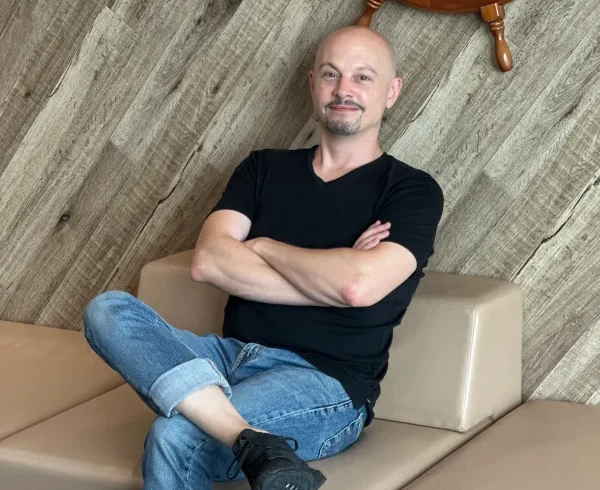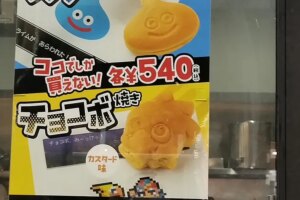
As a young man growing up in Ohio, Sean Elliott developed an interest in Japanese culture and history, particularly the exploits of the ninja and the turbulent Sengoku Era. After studying Japanese at university, his professor introduced him to a sister city program that allowed him to come to Japan, in particular to the city of Toyohashi in Aichi Prefecture. After teaching there for a year and finding that life in Japan suited him, he decided to stay in the country. He moved to Tokyo and immersed himself in corporate life for over three years, working as a recruiting consultant. However, what he’d always wanted to do was get into the gaming industry, and one company in particular.
A former pro gamer, Elliott loved Sega consoles from the Genesis to the Dreamcast, and of course, its games as well, including Shinobi and Virtual Fighter. Joining Sega, which he did in September 2024, was a dream come true. He’s currently a producer and project manager at the famous Japanese gaming giant. Read on for Elliott’s experience getting a dream job in Japan, and how you can, too.
Sean Elliott. Photo by ©SEGA.
Metropolis: What made you come to Japan?
Sean Elliott: I’d been a fan of Japanese history since I was young, and had studied it for fun. It started with just ninja and samurai, but then I started learning about the Sengoku Period, and I was hooked. Ever since then, I’ve been interested in Japanese culture and history.
In university, I had the opportunity to use an elective credit on anything, and I saw that they offered Japanese language courses. My university had a sister city program with the city of Toyohashi, and one day, my professor asked me if I would be interested in teaching English in Toyohashi as a government employee and a representative of the university. The rest is history.
M: How does living in Tokyo compare to Toyohashi?
SE: Completely different! I had a pretty easy time making friends in Toyohashi, but that was definitely not the case in Tokyo. Even though I was outgoing, I could tell that people weren’t interested in making random friends (which I totally understand). In a way, I had more of a culture shock moving from Toyohashi to Tokyo than I did from the U.S. to Toyohashi. I was pretty lonely at first, but I managed to make a solid friend group that’s only grown larger from there.
Tokyo obviously has a lot more to do, more areas to explore and more convenience with the trains. But I still love Toyohashi (maybe a bit too much). I was heavily involved with social activities there, like taking part in English seminars and learning sessions, festivals and tezutsu-hanabi. People were warm, and it had a feeling of community I’d never really felt before (nor do I think I’ve felt since).
M: How was your experience working as an English teacher and then a consultant?
SE: Oddly enough, it wasn’t nearly as difficult a move as I originally thought it would be. Both involved soft skills like asking questions, active listening, and being approachable. The fact that I had a double major in International Business and Marketing also made recruitment easier, as I understood what people did and could pinpoint roles and companies that they made a good fit for.
M: What attracted you to the gaming industry?
SE: I’ve always loved games. I had an Atari 2600 as a kid, and every generation of game consoles since. I played fighting games and first-person shooters competitively before e-sports were a thing. During university, my final papers and reports revolved around the game industry, the opportunities for growth in the industry and where it was going. So, I wasn’t just playing games, but also paying attention to the industry as a whole.
After graduating from university, I tried desperately to get into gaming with a focus on market research, but the roles simply didn’t exist anywhere near where I grew up. Not to mention, this was just prior to the Lehman Shock, and companies were already limiting open roles or going into complete hiring freezes, so I just gave up on the idea.
Sean Elliott with Sonic. Photo by ©SEGA.
M: Tell me more about your experience as a pro gamer.
I’d always been competitive since I played a lot of sports as a kid, but I hadn’t really ever considered that there were video game tournaments. When I got old enough to drive, I played a lot of Tekken 3 in the arcades with my friends. I became a regular and started making friends with the other regulars. We played in local tournaments, which expanded into traveling to other states.
It was really nothing like what e-sports are today. It was a group of six friends, packed in a car, driving for over five hours, getting a small hotel room and sleeping on the floor. We played the tournament the next day, then headed back home. Still, they were fun road trips. We got to see a lot of the country and met so many people, some of whom I’m still friends with today. In a weird way, the trip itself was more important than the tournament. It was that feeling of youthful freedom, that small window of time where you were old enough to explore, but the weight of responsibility hadn’t yet presented itself.
M: What are your favorite Japanese consoles and games, Sega or otherwise?
SE: My favorite consoles are probably the Sega Dreamcast and the Sony PlayStation 2. This is where I think the industry really felt like it was pivoting toward something bigger. Not only was this when the graphical fidelity of game consoles finally started matching arcade games, but this is also when in-game stories and narrative started maturing. At that time, developers were taking more calculated risks with designs. Yes, the previous console generation had this as well, but it just felt less “wild west” and more planned out.
As for favorite games, in no particular order: Chrono Trigger, The “Like a Dragon” Series, The Last of Us, Blasphemous 1 and 2, Capcom vs SNK 2, Tekken Tag Tournament, the Mega Man series… I should probably stop, as there are so many other titles I can name!
M: Why was SEGA your dream company?
SE: Because it’s Sega! (laughs)
Seriously, though, I have so many fond memories of playing Sega titles, it’s hard for me not to love them. Sure, it would be easy for me to just start listing all their consoles and console titles, but to me, there was something more to it.
It was those rare days as a kid, when your mom or uncle or whoever was taking you to the mall. You’d eventually make your way to the food court, which inevitably had an arcade. You’d walk in, and be blasted with lights and sounds from games that were all new to you. Eventually, you’d see those four blue, geometric letters, SEGA, lit up on a marquee, or painted on the side of a cabinet. And you just knew you were in for a high-quality experience.
It was leaning into your turns on the Hang-On motorcycle and flipping your vehicle in OutRun. It was pulling imaginary G’s and getting thrown around in Afterburner. Dancing with your friends to the digitized version of “Smooth Criminal” in Moonwalker. Laughing with your uncle while you crashed your Lancia Delta again in Sega Rally. It was those small slice-of-life memories that last a lifetime, on what normally should have just been a trip to the mall to buy some back-to-school clothes.
M: What type of work do you do there?
SE: I focus on Production and Project Management. Overall, I look at the quality of the game from a player’s perspective, consider risks to the project and mitigations, playtest to find issues, track the team’s progress, and more. It may not sound that exciting, but I absolutely love what I do.
M: Any advice for people from outside Japan waiting to get into the Japanese gaming industry?
SE: My journey was such a weird one that I feel it’s hard for me to give advice that would be applicable. However, the best advice I can give is to work hard, stay positive, prove yourself, have empathy, be honest, and follow through on promises. Take action toward your goals and just be a good person.
I know that all sounds terribly trite and generic, but, for what it’s worth, there is no reason why some kid from the middle-of-nowhere Ohio found themselves in the position they currently are in, aside from doing those things. I joined the industry quite late in my career and had no direct experience. But I think that by just doing the right thing and doing so with no expectation of reciprocation, it led me down a path that I never thought would have been possible. For that, I’m very thankful.
If you enjoyed this article on Getting Your Dream Job in Japan, check out:
Based in Japan: How to Get Permanent Residency in Japan in Two Years
Arthell Isom on Building the First Foreign-owned Anime Studio in Japan





